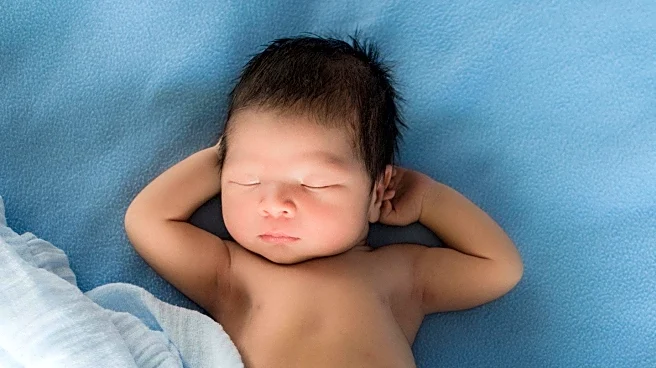What's Happening?
October marks SIDS Awareness Month, bringing attention to the critical issue of safe sleep environments for infants. Consumer Reports has identified several infant sleep products that may pose risks, including
suffocation and sleep-related deaths. Montserrat Vargas, a mother of two, emphasizes the importance of a safe sleep setup for her 3-month-old, ensuring no pillows, toys, or blankets are present in the bassinet. The American Academy of Pediatrics advises against bed-sharing, recommending that cribs or bassinets be placed in the parents' room to reduce the risk of sudden infant death syndrome by up to fifty percent. Consumer Reports also warns against using nursing pillows for sleep, citing over 150 infant deaths linked to these products between 2010 and 2022. Inclined sleepers were banned in 2022 due to their association with infant fatalities. Consumer Reports' safety tests revealed that some bassinets, like the Halo BassiNest Flex, may not remain flat, posing additional risks.
Why It's Important?
The findings from Consumer Reports underscore the importance of adhering to safe sleep practices to prevent infant injuries and fatalities. With SIDS being a leading cause of death in infants, the recommendations aim to educate parents and caregivers on creating safer sleep environments. The advice to avoid bed-sharing and use flat, firm sleep surfaces is crucial for reducing risks. The report also highlights the need for vigilance regarding product safety, as not all marketed sleep products meet safety standards. This information is vital for parents, caregivers, and manufacturers to ensure the well-being of infants and to push for stricter regulations and testing of infant sleep products.
What's Next?
As awareness grows, parents and caregivers are likely to become more informed about safe sleep practices, potentially leading to a decrease in sleep-related infant deaths. Manufacturers may face increased scrutiny and pressure to improve the safety of their products, particularly bassinets and sleep accessories. Regulatory bodies might consider implementing more stringent testing and certification processes for infant sleep products to ensure compliance with safety standards. Advocacy groups and pediatric organizations may continue to educate the public and push for policy changes to enhance infant sleep safety.
Beyond the Headlines
The focus on infant sleep safety also raises broader questions about consumer product safety and the effectiveness of current regulations. The ethical responsibility of manufacturers to ensure their products do not pose risks to vulnerable populations, such as infants, is a critical consideration. Long-term, this could lead to shifts in industry standards and increased consumer demand for transparency and accountability in product safety.










